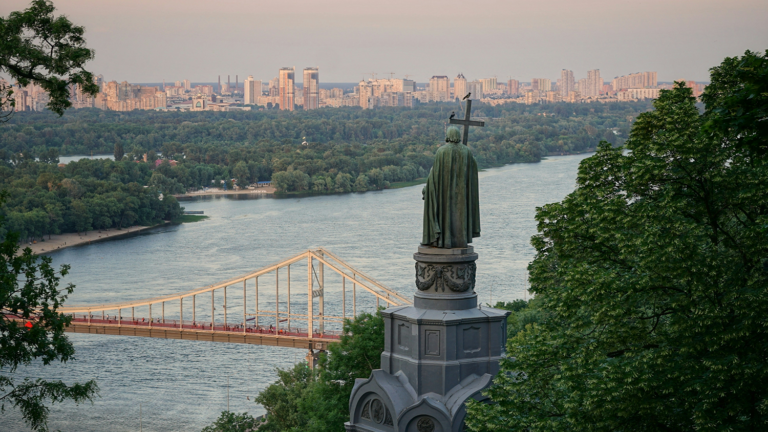
What I Learned This Summer, Planning a Trip to Ukraine
Before the summer of ’24, Ukraine was not unknown to me. Not at all. In years past, for example, my father-in-law led a construction team that repaired several churches in Mukachevo. A family friend married a Ukrainian woman, who has become a cherished friend. More recently, the modern icon we chose for our new home was written by a Ukrainian iconographer. In the icon, a very small Jesus takes his first steps —toddling between Mary and Joseph, who have left behind laundry and carpentry and flung out their arms, ready to steady him. A beautiful image of love and care from a faraway land.
Then in 2022 came the full-scale Russian invasion, and we found ourselves standing as our friend’s 10-year-old son played the Ukrainian national anthem at his piano recital in California. And almost daily we drove by a huge billboard completely covered by the Ukrainian flag with a single word superimposed: PRAY.
We found ourselves standing as our friend’s 10-year-old son played the Ukrainian national anthem at his piano recital in California.
Then came the invitation from the Ukrainian Catholic University to IACS to bring a delegation to Lviv — to see and begin to understand the circumstances in a country under siege. To look ahead and think together about what will be needed after the war. To envision solutions and imagine ways forward.
So, we began to plan. And in that planning I learned — that I had a lot to learn. But not only that, I also learned that I had a lot of willing teachers from right on campus at USC all the way to Ukraine itself. My first lesson concerned language. A USC faculty friend taught me: Lviv means “lion’s town,” and has several names, spellings, and pronunciations: In Polish, it’s Lwów; in Russian, Lvov; in Ukrainian, Lviv; in German, Lemberg. He told me, “The difference is important. It reflects a lot of history, and the best Ukrainian historian is Serii Plokhy at Harvard.”
So, I read Plokhy’s The Gates of Europe: the History of Ukraine and then watched Yale Professor Timothy Snyder’s class “The Making of Modern Ukraine.” I learned about Vikings moving south through Ukraine, about Christians and Muslims moving north; about Jews caught in the middle; about the differences between eastern and western Ukraine, about the complex religious situation, about the complicated legacy of communism and the USSR and the attendant variations in the meaning of freedom; about the importance of the 2013 Euromaidan, and the subsequent “Revolution of Dignity” in 2014.
From Ukrainians themselves I learned about the current situation and the trauma some are experiencing. A new colleague at UCU told me that right now Ukrainians “don’t hope.” They simply get on with life —knowing where shelters are and which ones have water and WiFi, downloading air alarm apps, keeping track of curfews and electricity schedules. They are “keeping calm and carrying on” in a context all too similar to wartime Britain where the phrase originated.
From a new colleague at Harvard’s Ukrainian Research Institute, I learned about Ukrainian scholars in exile and programs to help them continue their work and research. From one of those in exile in Canada, I learned of the trauma experienced by Ukrainian children and families and what Christian organizations are doing to help.
Through a faculty member at my own alma mater, Wheaton College, I met a multitude of people from disciplines across the academy — political science, psychology, medicine, sociology, and religion—and around the world who are willing to participate, to serve as resources, to make connections. And, yes, who are praying.
And I experienced beauty — the beauty of faith and perseverance, of teaching and learning, of creativity and enthusiasm. The beauty of hands outstretched in care and welcome. It is a beauty completely different, yet surprisingly reminiscent of the icon in our home. But the beauty no longer comes from a land faraway, but from people brought close living in a land disrupted by propaganda and fear, by explosions and loss.
I learned a lot this summer, planning a trip to Ukraine.
Unfortunately, the trip remains a plan. Arms are outstretched from either side of the Atlantic—almost to the touching point. But not quite. The trip has been postponed, planned now for next Easter. Perhaps symbolically the perfect time for the delegation, the time of Resurrection.
Editor’s note: Becky King Cerling, Ph.D., is executive director of the Institute for Advanced Catholic Studies at USC.